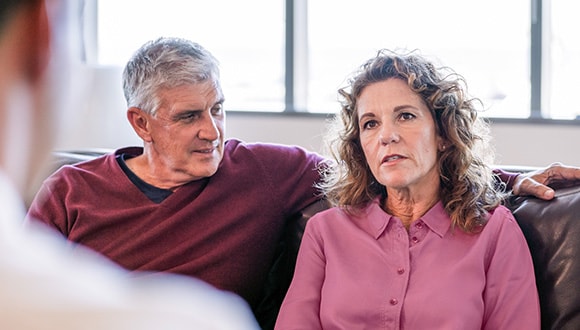7 ways to increase female libido
Updated August 2023 | 5 min read
Expert contributor Susan Davis, Professor of Women’s Health at Monash University
Words by Stephanie Osfield
With these seven effective ways to boost low libido, women can increase their sexual passion and pleasure, and reboot their desire.
Despite Hollywood and the media telling us that women are almost always up for sexual encounters, in reality, low libido affects 26% of premenopausal women and just over half (52%) of menopausal women.
According to Jean Hailes Foundation for Women’s Health, libido or ‘sex drive’ is a form of erotic arousal that leads us to desire the pleasure and intimacy we enjoy during sex. In response, blood flow increases to a woman’s genitals and her vagina produces more lubrication. Yet libido levels vary from woman to woman and may dip at any age, leading to less desire to have sex or to less pleasure during sexual experiences.
“Low libido can be triggered by life pressures, mental health issues, thyroid problems, relationship difficulties, some medications or changes to hormones,” says Susan Davis, Professor of Women’s Health at Monash University. A woman’s body image also affects her sexual self-esteem and libido.
A healthy sex life can be an important part of a successful romantic relationship, and a woman’s overall wellbeing. Studies show the emotional high that comes from sex can greatly benefit wellbeing for both women and men, and that couples are more likely to display increased affection – like hugging and kissing – after sexual activity. Acts of affection can release oxytocin (the feel-good hormone) in the brain, which leads to a greater sense of wellbeing, a decrease in stress levels and an increased sense of calm, better sleep, and better social relationships.
If your desire takes a dip, you could be too tired, busy or embarrassed to seek help, but it’s important that you do. It’s helpful to remember that changes in sex drive happen to almost everyone at some stage, and the following lifestyle tweaks, and the right medical support, can increase libido and help rekindle arousal and desire.

1. Take more time with foreplay
Going slow in the lead-up to sexual intercourse can greatly upgrade a woman’s enjoyment of sex and her ability to reach orgasm.
Libido-boosting tips:
- Linger on foreplay: instead of treating kissing and hugging as sexual appetisers, savour them like a main course. “Studies show that lengthier foreplay can increase a woman’s arousal, relaxation, lubrication and pleasure during sex,” says Prof Davis.
- Share a shower or a bath: this can relax and arouse you at the same time.
- Give each other a massage: touch often increases desire and it makes you feel more connected and cared for.
2. Exercise regularly
“As well as enhancing blood flow, which enhances [your] sexual response, exercise can improve a woman’s confidence and self-image, having positive effects on her sexual wellbeing,” says Prof Davis.
Libido-boosting tips:
- Work out: exercise regularly over the week and make sure you mix up your routine to boost aerobic fitness as well as flexibility, strength and balance.
- Keep your pelvic floor muscles in shape: ‘Kegel’ exercises, can increase the intensity of a woman’s orgasm, sexual pleasure and arousal. To get started, squeeze your pelvic floor for six seconds then release for six seconds. Do this six times, then have a two-minute break. “As your pelvic tone improves, include ‘elevator’ Kegels (tighten muscles in increments, like a lift stopping on different floors) and quick Kegels (10 quick flexes),” says Prof Davis.
3. Shake up your sexual routine
Making a small adjustment to break up your sexual routine can increase your arousal and libido.
Libido-boosting tips:
- Change it up: “Creating more spontaneity or having sex in a different place and a different sexual position can sometimes increase arousal and make reaching climax easier,” says Prof Davis.
- Read erotic literature alone or out loud to each other: sexy and seductive words can be a powerful aphrodisiac.
- Add sensual props: use a blindfold, candlelight or music to set a more seductive scene. Trying something new can create a more sexually charged atmosphere.
4. Deal with vaginal dryness
Sometimes women experience a drop in desire because sex feels uncomfortable, or even painful. If you experience pain during sex, talk to your GP. A common cause is loss of natural lubrication, which can be triggered by medications and hormonal changes during pregnancy, breastfeeding, perimenopause and menopause.
Libido-boosting tips:
- Use lube: choose a water-based lubrication, as oil-based varieties can reduce the effectiveness of condoms. “Saliva is also one of the best lubricants,” says Prof Davis.
- See your GP: “Using an oestrogen cream in the vagina twice a week can greatly reduce sexual discomfort,” says Prof Davis. “If you’re in peri or menopause, your GP may also suggest using menopausal hormone therapy for a while.”

5. Address your stress
“Stress can cause chronic exhaustion, which can lower a woman’s sexual desire,” says Prof Davis. The resulting stress hormones, adrenaline and cortisol, can also lower arousal by putting you in a fight or flight state, where your brain thinks you’re in danger. It’s hard to feel sexy when you feel that way. Relationship stress can also cause emotional tension and distance which may spike stress hormones and reduce sexual arousal.
Libido-boosting tips:
- See a relationship counsellor: they can help you talk through and adopt strategies to reduce issues like arguments, disconnection and feeling taken for granted.
- Seek individual counselling: using a range of different approaches, counsellors can provide mental health support to address low mood, depression, anxiety and burnout.
- Do daily relaxation exercises: try yoga, meditation or progressive muscle relaxation (where you tense and release all your muscles from top to toe).
- Take time for self-care: enjoy a candlelit aromatherapy bath, go for a sunset walk, or block out half an hour daily to read a book, tend your rose garden or pursue other passions.
- Prioritise sleep: aim for seven to eight hours a night. Sleep loss has been shown to reduce a woman’s sexual desire. This may be due to changes in body clock, mood and energy.
6. Do things together
As well as going out to fun places together, set up dates in the morning or evening with your partner to have sex. This creates anticipation, which can increase female libido.
Libido-boosting tips:
- Enjoy sex before dinner: that way a full stomach won’t make you feel sleepy.
- Engage in flirty texts: this will build sexual excitement all day.
- Organise a sleepover for the kids: enlist the help of grandparents or friends and enjoy a full evening to yourselves.
7. Share all the chores
Aussie research shows that women enjoy a higher libido and feel happier and more satisfied when they’re in relationships where there’s more equality, with both partners handling household chores, bills and appointments.
Libido-boosting tips:
- Set a roster for domestic chores: cook and clean together or rotate chores so you take turns doing them on different days or alternate weeks.
- Divvy up other tasks: that includes paying bills, organising for the dog to see the vet and the kids to see the dentist. These organisational tasks often fall to women and create a mental load which can also dampen libido. Lightening that load is good for your mental health as well as your sex life and your relationship.
Menopause Matters podcast
Your libido can fluctuate naturally throughout your life, but menopause can make the changes more dramatic. In our Menopause Matters podcast, join host Alison Brahe-Daddo as she unpacks the experience of this life-changing yet entirely normal part of life. Speaking with leading menopause experts, Alison sheds light on issues faced by many women, including some of the best ways to manage your symptoms, how to navigate your career, mental health and relationships during this time, and shares the joys of life post-menopause. Listen to Menopause Matters podcast on your device through Apple Podcasts, Google Podcasts and Spotify.
RELATED ARTICLES
MENOPAUSE RELIEF
If you’re approaching or experiencing menopause, you’re probably aware of how it can affect your mind and body. Here’s how to manage the symptoms.
Managing the mental load
Feeling overwhelmed by the mental load of family life? Here’s how to set boundaries and keep things running efficiently.
Is HRT safe?
There’s a lot of confusion around the safety of Hormone Replacement Therapy. We weigh up the evidence.
How to sleep better
Struggling to get enough good quality sleep? Here’s what you need to know.